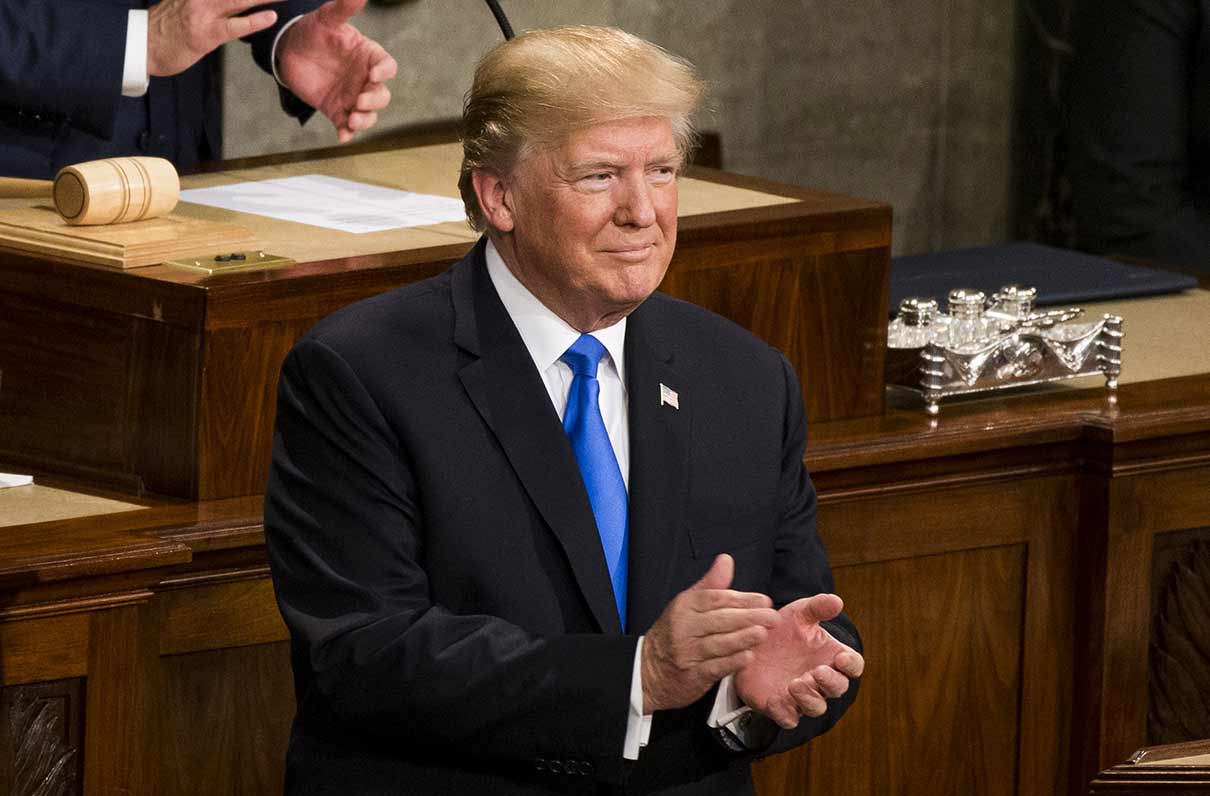(Updated Jan. 29)
By MOAA Staff
President Donald Trump has accepted House Speaker Rep. Nancy Pelosi's invitation to deliver the State of the Union on Feb. 5.
At that time, the administration and Congress will perhaps be able to move past partisan rancor and put forward a plan of action for issues critical to our nation's defense and the benefits earned by servicemembers past and present.
Below are six issues MOAA hopes President Trump will put forward during the address. What military topics would you like the President to cover during the SOTU? Email us: editor@moaa.org. And check out the Legislative Action Center for how you can engage your representatives on these topics and others.
1. Protect pay for all uniformed servicemembers and retirees. While the government may be fully funded when the speech is delivered, there's far from any guarantee that a long-term solution will be in place. As of now, Coast Guard, NOAA, and USPHS members haven't been getting paid, and while retirees from these services have been protected to this point, some could begin missing checks in the coming days. If the speech comes during a temporary government opening, a move that has been proposed by some legislators in the past, the President must offer plans to protect these servicemembers from any future closures.
MOAA, a nonpartisan association, will not take a stand on the plans in play, but we remain adamant our nation's leaders owe these servicemembers a solution. If full government funding is not in the immediate future, legislation such as the Pay Our Coast Guard Act should be passed, not only for Coast Guard members, but similarly in support of commissioned officers in the National Oceanic and Atmospheric Administration Commissioned Officer Corps and the U.S. Public Health Service.
2. Pass fiscal year 2020 federal appropriations on time. The simple solution to stopping shutdowns is to take deliberate actions to prevent them. An early appropriations cycle - one without sequestration, without budget cuts to DoD or VA activities, and without cuts to military and veteran benefits as a way to pay for larger economic problems - is a must-have to fix a broken budget system.
3. Repeal the 'widows tax.' With 271 co-sponsors from the House and 51 from the Senate on bills supporting this repeal in the previous Congress, gaining early support from the president will be seen as a welcome sign of support early in this Congressional session. Military survivors whose sponsors die of service-connected issues are eligible for two federal benefits: a sponsor-purchased Survivor Benefit Plan (SBP) from DoD and Dependency and Indemnity Compensation (DIC) from the VA. But current law requires money paid from SBP to be reduced dollar-for-dollar by the amount paid by the VA's DIC. MOAA strongly believes the widows tax should be eliminated. These programs are paid for two separate reasons: SBP is a servicemember-purchased plan to ensure a continued financial benefit for a servicemember's survivor. DIC is a monetary benefit paid to eligible survivors whose sponsors die from a service-connected injury.
[ACT NOW: Send your own message to Congress to end the widows tax.]
4. Authorize a full military pay raise. The forecasted pay raise, which is based on the Employment Cost Index (ECI), is 3.1 percent. The ECI is the legislated benchmark from which the military pay raise is to be based. Approving the ECI-based pay raise this year will continue to recognize our national commitment to ensuring military pay raises keep up with increases to salaries and wages of workers from private industry.
5. Stabilize TRICARE. The Congressional Budget Office's recent report sounds familiar, but still alarming, warning about the potential of raising or creating new TRICARE fees to fight the federal deficit. These efforts need to be neutralized immediately, with strong words from the President and others in Washington. Moving forward, TRICARE legislation should include movement to reverse or significantly decrease the 2018 TRICARE Prime copayment increases for grandfathered/Group-A beneficiaries, as well as a modified fee structure that would cut out-of-pocket costs for beneficiaries seeking physical therapy, mental health care, or other types of care that require regular specialty appointments.
[READ MORE: Don't Let TRICARE For Life Become a Target.]
6. Pass meaningful toxic exposure legislation. Last year, veterans advocates and supporters in Congress came so close to critical legislation that would acknowledge the Agent Orange exposure of so many Vietnam-era “Blue Water Navy veterans” and provide them the health care benefits they deserve. But the measure failed in the Senate, and advocates like MOAA are entering the fray once again. Two bills have already been introduced in the House.
Blue Water Navy veterans, for the most part, have not spent time on combat's shore, but nevertheless, are suffering today due to their exposure to the toxic agent while underway. There are approximately 90,000 of these veterans alive today, but they are passing away at a rate of about 2,700 per year. Timing is critical, and the President's endorsement for this cause could be the catalyst for stepped-up action by the Congress.
